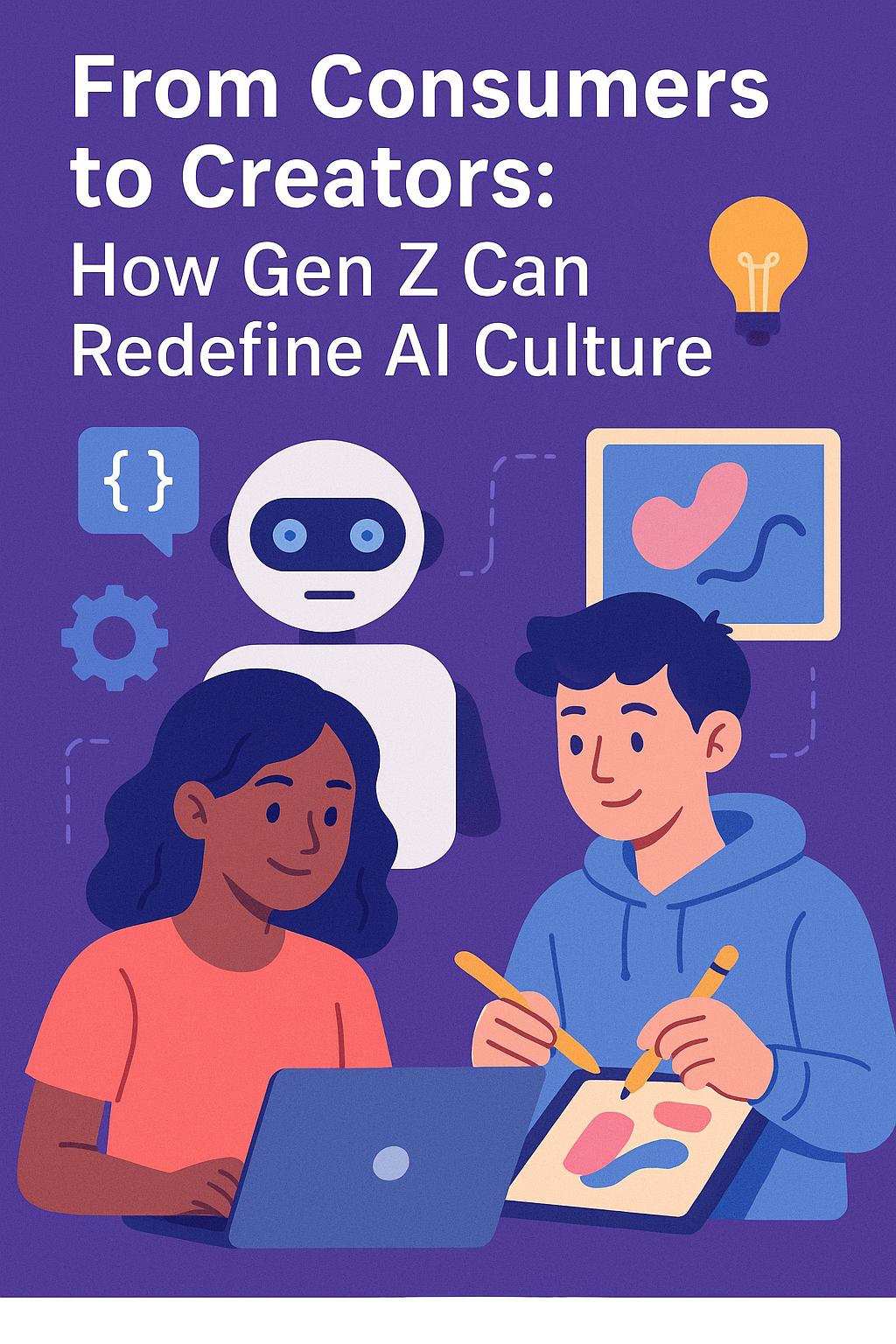
From Consumers to Creators: How Gen Z Can Redefine AI Culture
The rise of generative artificial intelligence marks a cultural turning point, and Gen Z is standing right at the center of it. Born between 1997 and 2012, this generation has never known a world without algorithms, recommendations, and automation. But what makes Gen Z different is not that they use AI, it’s that they’re reshaping how society understands it. For the first time, we’re seeing young people move from being consumers of technology to creators and curators of AI culture itself.
Gen Z is the first truly digital-native generation, and AI feels to them like a natural extension of creativity rather than a threat to it. They grew up with algorithmic feeds curating their entertainment, but now they’re turning those same algorithms into creative partners. Whether it’s designing artwork with DALL E, generating scripts for short-form videos, remixing music with AI filters, or creating deep-fake satire to comment on politics and pop culture, Gen Z is not passively watching the AI revolution; they’re co-authoring it. Unlike older generations who often approach AI with caution or skepticism, Gen Z tends to see it as a canvas: a set of tools to experiment with, to learn from, and to challenge. That shift, from consumption to creation, is one of the most powerful aspects of what’s happening right now. Previous waves of the internet turned users into content creators through blogging, YouTube, and social media. But generative AI lowers that barrier even further. You no longer need to know how to draw, code, or produce music to create something that feels professional. That democratization of creativity has made AI a social equalizer. For Gen Z, creativity isn’t about mastery of a skill, it’s about mastery of an idea. They’ve redefined authorship as a collaborative act between human imagination and machine assistance. Still, this new creative freedom comes with its own set of challenges. Gen Z faces the paradox of growing up in a hyper-automated world where the same tools that empower them also threaten to replace them. Entry-level jobs are being automated; “junior” creative roles are the first to be filled by AI systems. The same generation teaching older colleagues how to use ChatGPT is also the one most vulnerable to its impact on employment. This tension forces Gen Z to think differently about the future, not just how to use AI efficiently, but how to use it ethically and authentically. Questions about authorship, bias, and originality aren’t abstract to them, they’re personal.
That’s where Gen Z’s values come in. This is a generation that demands transparency, inclusivity, and authenticity. They question where data comes from, who profits from it, and whose stories get told by machines trained on the internet’s collective memory. They understand that AI reflects society’s biases, and they’re not afraid to call it out. Through activism, digital art, and education, many young creators are using AI not just to entertain but to critique, to educate, and to provoke change. For them, technology and identity are intertwined, and AI becomes another tool for expressing who they are, what they believe in, and what they refuse to accept. To redefine AI culture, Gen Z doesn’t need to invent entirely new tools, they just need to reshape how we use them. That means learning not only how to prompt an AI effectively but how to question its results. It means treating AI as a collaborator rather than a replacement. It means creating communities that share not only art but the process behind it, the “how I made this” becoming as valuable as the final piece. It means building collective ethics around attribution, consent, and bias rather than waiting for corporations to do it for them. In this sense, Gen Z isn’t just building new creative outputs; they’re building a new cultural literacy.
Imagine classrooms where students learn not just to use AI but to interrogate it, analyzing how prompts shape meaning, how datasets shape truth, how algorithms decide visibility. Imagine workplaces where young employees mentor older ones on AI workflows while learning strategic and ethical thinking in return. Imagine digital platforms where AI-generated work is labeled transparently, and originality is defined by human intention rather than machine novelty. This isn’t a far-off dream, it’s already happening, slowly, wherever Gen Z collaborates, learns, and creates.
The future of AI will not be defined solely by coders or corporations. It will be shaped by culture, by the millions of small creative decisions made by individuals who decide what’s acceptable, what’s inspiring, and what’s human. Gen Z, with its hybrid fluency between technology and identity, has the rare ability to turn AI from a cold mechanism into a medium for storytelling, community, and empathy. They can push society to move beyond the fear of being replaced by AI toward the excitement of co-creating with it. The story of Gen Z and AI, then, isn’t one of dependence or domination, it’s one of partnership. From consumers to creators, from passive scrolling to purposeful making, they are teaching the rest of us a new kind of digital literacy, one rooted not just in skill, but in consciousness. If AI is to become part of human culture, not just human productivity, it will be because Gen Z made it so: by infusing it with curiosity, ethics, humor, rebellion, and imagination.
They are not waiting for the future of AI, they are already building it, one prompt at a time.